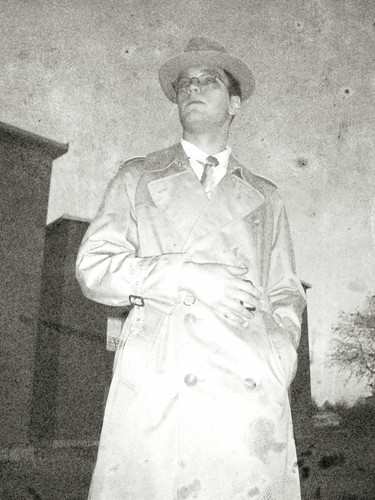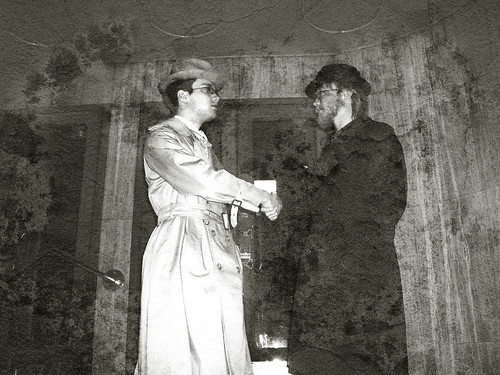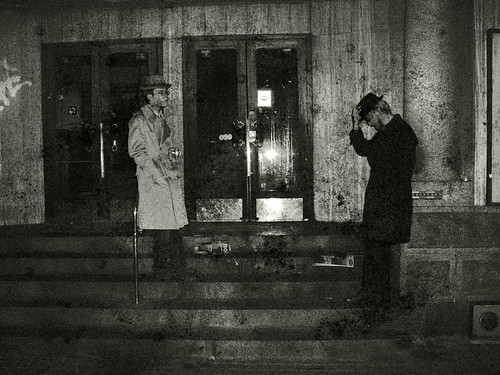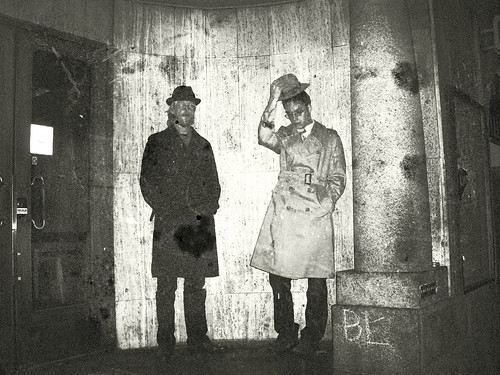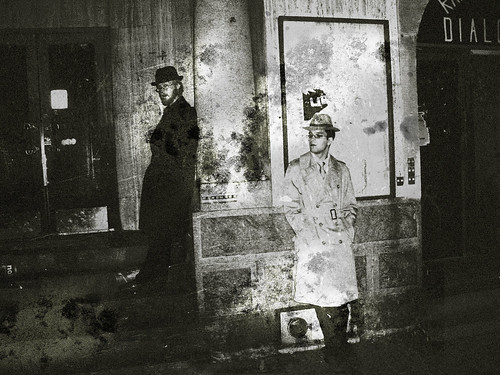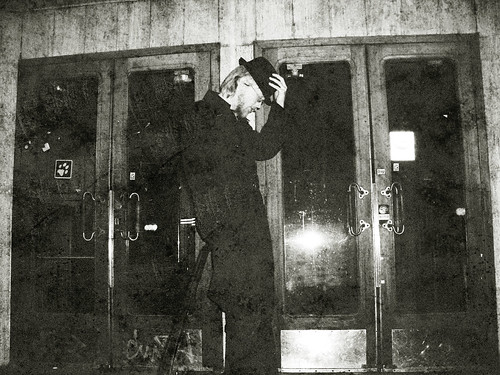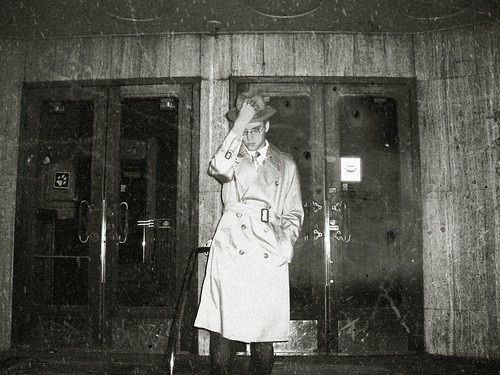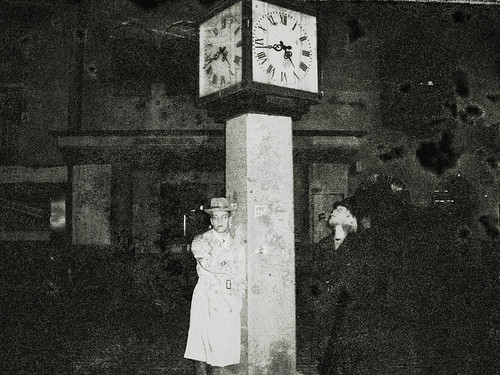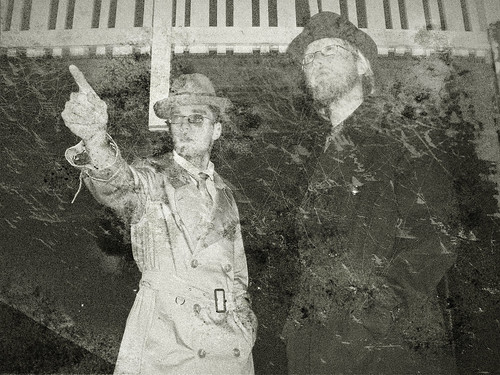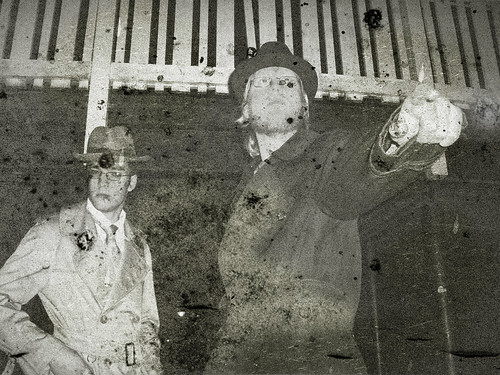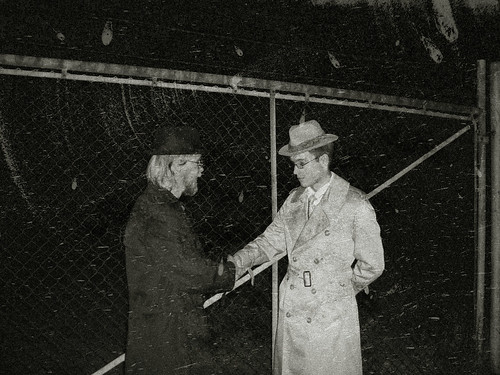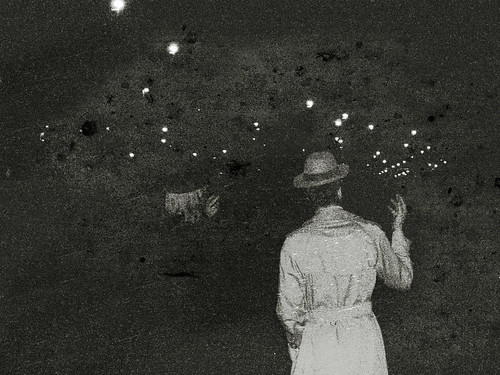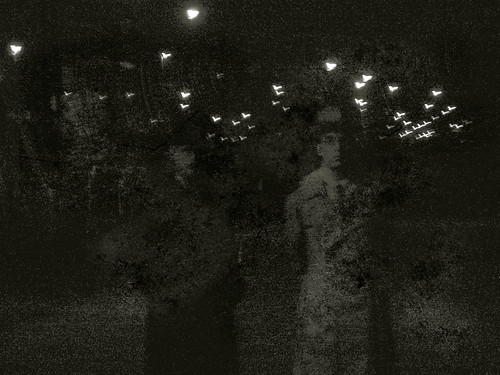The Tale of a Secretary, Chapter V: Reaching the Rubicon
Committee report
The Tale of a Secretary, Chapter I: Scenery of Salvation
The Tale of a Secretary, Chapter II: Introduction to a Diligent Task
The Tale of a Secretary, Chapter III: The Smiling Man
The Tale of a Secretary, Interlude: Mr. Reed's Everyday Life
The Tale of a Secretary, Chapter IV: Trahison D'être
The huge room was dimly lit and comfortable for the eyes of those who dwell in twilight. An omnipresent humming and rattling of machinery drowned the echoing sound of feet on metal catwalks despite the high roof. Interlinking pathways well above ground created a web of passages that allowed traveling from one side to another of the industrial facilities without having to resort to maneuvering between the engines and undefined contraptions on ground level, which could be more than a little hazardous at times. Countless industrial accidents have bereaved factory directors of their workers in this kind of environment, and thusly Reed and Libel did well to confine themselves to the ascended esplanades. Not that they’d be so clumsy as to loose an arm or two to a vicious lathe, but unnecessary risk taking is... unnecessary.
Almost unseen in the shadows and rather silently they moved about - apparently without a purpose, because they were on their fourth lap around the factory now. Reed kept track.
“James, why are we here again?”, he asked with feigned weariness.
“We’ve already been through all of this, John. Is there any reason we should not exercise our right of sneaking around in semi-abandoned factories late at night? You’re acting as if this wasn’t our natural habitat.”, Libel answered.
Reed grumbled a reply of sorts and then shrugged.
“That may very well be, but I prefer the comfort of my manor over this pointless chase for self realization, Mr. Garrett.”
“Come now, you can do better than that… Taffer!”, Libel retorted.
Far below them and well out of earshot a hoarse whisper slipped between the lips of a hidden watcher: “Blindness is the manfools theys gathers up treasures and greeders themselves on gold rocks and fetters. The Woodsie One wreaks thems with lilacs and nettles and gathers theys bones for his porridge and feathers.”
The words were uttered by a thin man in a sinister hat. Under the brim two dark and intense eyes peered out. He was ogling the men above, though it was slightly different from the ogling conducted by old men at schoolyards. This was ogling with intent. The moonlight shining in from a large but dirty window outlined the men, making them ideal targets for a hidden assassin – which, incidentally, was exactly what the watcher was. He wasn’t excessively apt at his craft, though. Where others strived for perfection; that perfect, silent kill and stealthy getaway, he settled for getting the job done. No more, no less. What he lacked in style he made up for with brutality.
Trained from a young age by them he was now their weapon. Taking care of Reed and Libel was to be his final test, a rite of initiation and a chance to prove his worth with grim finality to the mysterious organization that is on the tip of the tongue of every conspiracy theorist worth his mettle. More than one corpse could attest to his ambition, had they only been able to tell the tale. Or speak at all, for that matter.
Curiously, chance had made it that just that – whether the dead could speak from beyond the grave – was under vigorous debate in the City at that time. One side bolstered countless witnesses and channelers as evidence for an afterlife where loved ones, ever so benevolent, sat around, just waiting for those people with the special power to open the gate between the realm of the living and realm of the dead to pass on their messages of general good-will to the living relatives: “It’s OK, son. I love you.”; “Don’t worry about me, I’m fine. Your mother is here with me.”; “Remember to take the stake out of the oven tonight. Oh, and polish the chandelier, would you.”; “Give me back the five dollars you stole from my purse, you twat! You have the money from my life insurance to live on now!”
Due to the highly anecdotal character of this evidence, the skeptics, in knowing the human fallibility, rejected this idea. Perhaps they also disliked it on the basis that their loved ones had better things to do on the other side than indulge the whims of the living. Or perhaps the thought of a dead mother-in-law’s never-ending nagging was too much for them to bear with sanity intact, causing them to tuck away that notion in that dark corner of the mind where such unpleasantries are stored, rationalizing what some considered to be humanity’s greatest discovery.
Truth or falsehood - the assassin would soon find out, for he too was watched. Not only by Reed and Libel, who of course had noticed him the moment he started following their trail, but also by his teacher and mentor. Distrust is a common trait among those who rely on secrecy as a means for survival and the Smiling Man wore his distrust like a badge of honor.
Judging that they had exercised their rights enough for one night Libel led the duo towards the exit, which in their case was the same open window in the men’s room from where they had snuck in.
The light was still on, as they had left it. When they entered the facilities they immediately noticed the assassin’s biggest mistake so far: His feet were visible from under one of the stalls. Reed mouthed the word ‘amateur’ to Libel, who nodded in agreement as he quietly hid in the booth next to the assassin. Reed continued to walk towards the window, anticipating the whispering sound of a blade racing towards his open back just in time to dodge it. Before the assassin had time to grasp the situation he was in, he fell unconscious to the floor, as men usually do after taking one of Libel’s famous two-hand punches to the neck.
“Well, that was easy.”, Libel said.
“This one is just a pup. What are they doing, sending fledglings after us?” Reed rhetorically asked. “They can’t be getting that desperate, now, can they?”
Libel shrugged. “What are we to do with this one?”
“We could take him with us and chain him in the basement, then call him ‘it’ and poke him with a stick every now and then…” Reed suggested.
“I don’t see us as the lotion and basket kind of men.”, Libel said dismissively.
“True enough. Leave him, then?”
“I think that would be for the best, yes. I loathe taking the life of someone in cold blood. And I doubt he knows anything.”
“Agreed. Let’s leave this place; I’m staring to feel a certain craving for the flesh of dead animals.”
“Ah, yes. Food would indeed be nice.”, Libel agreed.
At that moment the lights went out. Neither man had noticed the hand reaching in, flicking the switch next to the door. What next happened can best be described as controlled chaos. Lady Entropy made her entrance and stirred things up, as an explosive device landed between Libel’s feet. The familiar sound of metal bouncing on the stone floor made Libel cringe.
“Out!”, he yelled and threw himself out the window. Reed followed suit and caught most of the blast wave, propelling him a full fifteen feet horizontally, whereas Libel landed just below the window, two floors down on the ground. Reed’s coat protected him from most of the shattered glass flying through the air. Somehow the hat was still on his head, but unfortunately that did little to protect him as he, too, hit the ground a few seconds later.
Bruised but not seriously hurt they regained their bearings, but they had no time for leisure and dilly-dallying, for soon another grenade came searing down. This time they both made it to safety before the detonation. Scattered as they were they made for bad targets and thusly that grenade was the last hurled at them that night.
After a brief moment of eye contact they both started moving back towards the factory building, keeping out of line-of-sight from the now gaping hole where once had been a rather insecure window. They had unanimously decided to find out who had the impudence to interrupt their dinner plans.
The Smiling Man cursed under his breath. He had hoped to take out all three in the first explosion, but had only managed to rid the world of his poor apprentice. Hurriedly he now back-tracked to the opposite entrance, where he planned to escape this precarious situation before encountering his nemeses.
As he entered the huge main room the doors below opened. There was a moment of recognition as his eyes met Reed’s. Knowing that he had the advantage of higher ground the Smiling Man upped his pace and started running. The heels of his boots on the metal catwalk sent loud echoes ringing trough the gloom. As he navigated past minute obstacles with uncanny speed something hit his knee. He staggered, his legs almost buckled, but he kept pressing on.
Libel had found a box of screws and both he and Reed now threw fistfuls of them at the fleeing figure. The stainless steel rained upon him, some landing a couple of steps ahead. It was upon one of those that the Smiling Man trod and fell.
How ironic that one of mankind’s greatest enemies should meet his demise because of such a tiny thing as a screw. This goes to show that even the fall of gods can be ascribed to a failure to take all details into account in combination with recklessness. In this case, the positioning of all present objects in the current time-space made for a particularly bad landing. The Smiling Man broke his back in two places as it made contact with a large, turning cogwheel. Caught up in its momentum, he was neatly cut in half when the cogs he was lodged in-between met their partner in the opposite wheel.
It wasn’t pretty, but not everyone can expect to have the luxury of an aesthetically pleasing end…
He stood alone. Around him a vast square stretched as far as the eye could see, its stones crumbling and worn with age. Water dripped from the broken mouth of a woman, adorning the fountain just before him. She was of marble must at one time have been considered a beautiful work of art, the pinnacle of a now extinct civilization. Not so anymore, with her legs twisted by deep cracks and one arm fallen at her feet.
At the horizon huge gray buildings loomed, long ago forsaken by their masters. On the nearest he could barely make out a torn banderole carrying the message a revolution now gone stale. Withered slogans, monuments of the naïveté in belief in change for the better, were of no use to him. He easily discarded their rallying cry for action.
With a last complacent smirk, knowing that with his death one part of the Device would activate, the Smiling Man drew his last breath and lost himself in the landscape of his dreams.

